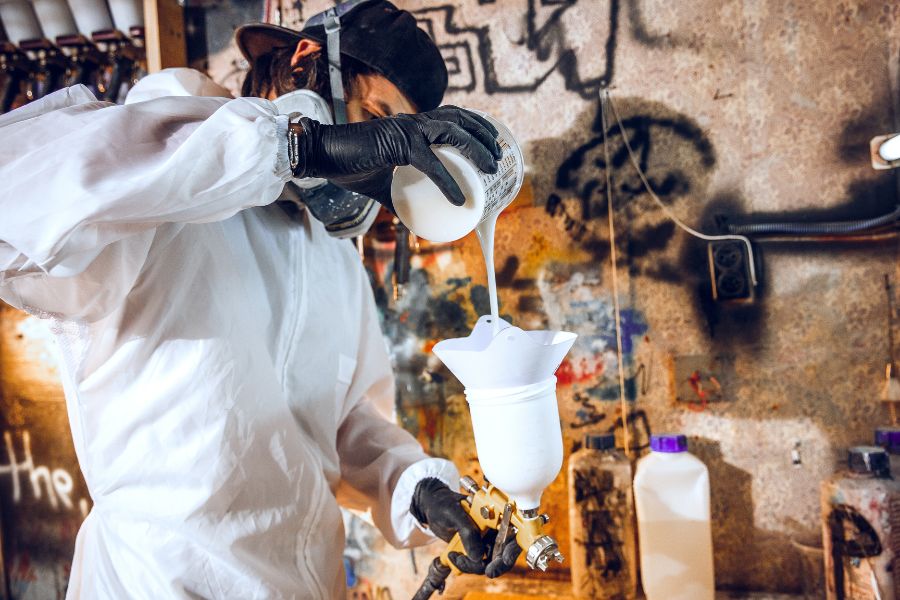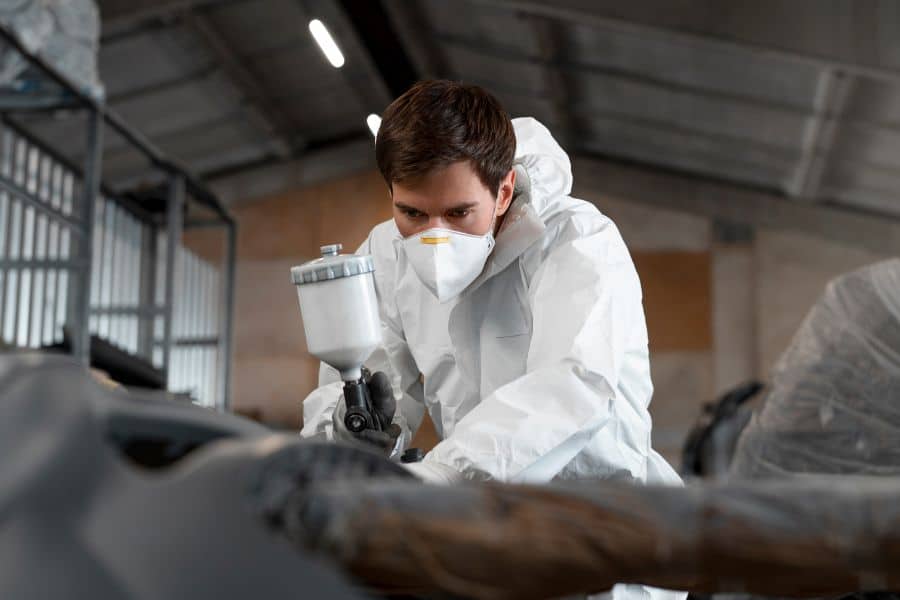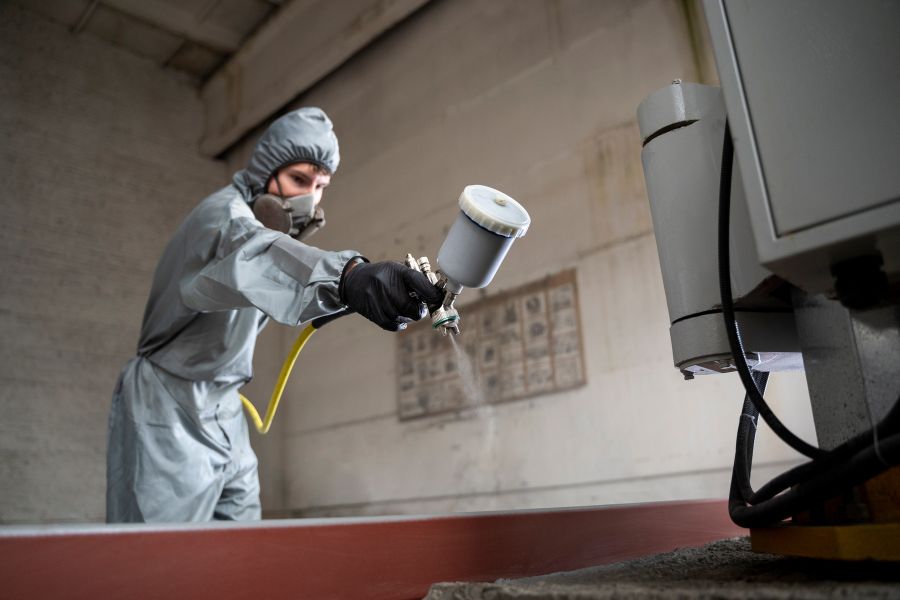Learn 10 Essential Skills of Coating Inspection with our Coating Inspector Course
Introduction

Coating inspection is a critical aspect of many industries, ensuring the durability and performance of various structures and equipment. Whether it’s the protective coating on a bridge, the paint on an industrial tank, or the anti-corrosion coating on an offshore platform, the quality of the coating plays a vital role in preventing corrosion, extending the lifespan of assets, and ensuring safety. To excel in this field, individuals often pursue a Coating Inspector Course. This comprehensive training equips them with the necessary knowledge and skills to become proficient coating inspectors. In this blog, we will explore the top skills you can expect to learn in a Coating Inspector Course and how they can benefit your career in the industry.
Understanding Essential skills one can learn from Coating Inspector Course
1. Surface Preparation
One of the fundamental skills learned in a Coating Inspector Course is surface preparation. Before applying any protective coating, it is essential to ensure that the surface is free of contaminants, rust, or any other imperfections. This process involves cleaning, degreasing, and abrasive blasting, if necessary. A coating inspector is trained to assess and ensure the proper surface preparation, as this significantly affects the adhesion and longevity of the coating.
Surface preparation also includes knowledge of the different types of substrates, such as steel, concrete, or wood, and the specific methods required for each. Coating inspectors must understand the industry standards and guidelines related to surface preparation to ensure that it meets the required specifications.
2. Coating Application Techniques
A Coating Inspector Course covers various coating application techniques. Understanding how to apply coatings correctly is vital to achieving the desired protective and aesthetic results. Students in these courses learn about different application methods, such as spraying, brushing, and rolling. They also gain knowledge about the equipment and tools used for coating application.
Additionally, coating inspectors are trained to recognize the appropriate conditions for applying coatings, including temperature, humidity, and surface preparation. They learn to identify potential issues during the application process, such as inadequate film thickness or improper mixing of coating materials, and how to rectify these issues in real-time.
3. Coating Material Knowledge
Coating inspectors must be well-versed in various types of coating materials, as different projects and environments require specific coatings. In a Coating Inspector Course, students acquire knowledge about the properties, advantages, and limitations of coatings, including epoxies, polyurethanes, polyaspartics, and more. They also learn about the suitability of coatings for different substrates and environmental conditions.
Understanding the chemistry and properties of coatings is crucial for making informed decisions regarding material selection. Coating inspectors need to ensure that the chosen coating is compatible with the substrate and will provide effective corrosion protection.
4. Coating Inspection Techniques
One of the core skills that coating inspectors develop is the ability to conduct thorough inspections of coatings. They are trained in various inspection techniques, including visual inspection, dry film thickness measurement, adhesion testing, and holiday detection.
Visual inspection involves assessing the coating for any visible defects, such as pinholes, cracks, or blisters. Coating inspectors also learn how to use instruments like dry film thickness gauges to measure the thickness of the applied coating. Adhesion testing is essential to check if the coating is bonding properly with the substrate. Holiday detection is used to identify any discontinuities or breaches in the coating that could lead to corrosion.
5. Health and Safety
Safety is paramount in the coating inspection profession. Coating inspectors are trained to recognize potential hazards in their work environment and to take appropriate safety measures. This includes understanding the proper use of personal protective equipment (PPE), fire safety procedures, and handling hazardous materials.
A Coating Inspector Course ensures that students are aware of industry-specific safety guidelines and regulations. Safety training is a critical aspect of the course, as the coating industry often involves exposure to chemicals, confined spaces, and high-risk work environments.
6. Understanding Industry Standards and Codes
The coating industry relies on a wide range of industry standards and codes to ensure quality, safety, and consistency. Coating inspectors need to be well-versed in these standards to ensure that projects meet the required specifications.
In a Coating Inspector Course, students are taught about widely recognized standards such as those provided by NACE International (National Association of Corrosion Engineers), SSPC (The Society for Protective Coatings), and ISO (International Organization for Standardization). They learn how to interpret and apply these standards to various coating projects, ensuring that the work is compliant and of high quality.
7. Corrosion Prevention and Control
Understanding corrosion mechanisms and methods of prevention is integral to the role of a coating inspector. Coating inspectors need to identify potential corrosion risks, select appropriate coating systems, and ensure the quality of coatings to protect assets from deterioration.
Coating inspector courses cover the science behind corrosion, including factors such as humidity, temperature, pH, and electrolytes. This knowledge allows inspectors to make informed decisions regarding coating systems that will effectively combat corrosion in specific environments.
8. Report Writing and Documentation
A crucial aspect of a coating inspector’s job is documenting their findings and communicating them effectively. Coating inspector courses teach students how to write comprehensive inspection reports that include details on surface preparation, coating application, inspection results, and any issues or recommendations.
Effective communication is vital in the coating industry, as inspection reports are often used by project stakeholders, engineers, and quality control teams to make decisions regarding the acceptability of the coatings. Coating inspectors must be able to convey their findings clearly and concisely.
9. Problem-Solving and Troubleshooting
Coating inspectors often encounter challenges and unexpected issues during projects. The ability to think critically and troubleshoot problems is a valuable skill acquired through a Coating Inspector Course. Inspectors learn how to identify the root causes of coating defects and develop strategies to rectify them.
Problem-solving skills are particularly important when coatings are applied in complex or demanding environments, such as offshore platforms or industrial facilities. Coating inspectors need to adapt and find solutions to ensure the long-term integrity of coatings.
10. Quality Assurance and Quality Control
Quality assurance and quality control are integral to ensuring the success of coating projects. Coating inspector courses teach students how to implement quality control procedures to monitor and verify that coatings are applied according to the specified standards and requirements.
Conclusion
Inspectors must understand how to conduct audits, inspections, and tests to confirm the quality and durability of coatings. This involves both field and laboratory testing to evaluate coating performance.
As a leading institution in the field of corrosion and protective coatings, the Corcon Institute of Corrosion is committed to providing the highest quality education and training to aspiring coating inspectors. We are proud to offer a Coating Inspector Course that equips individuals with the essential skills and knowledge required to excel in this critical industry.
The skills outlined in this blog are just a glimpse of what our course entails. At Corcon, we go the extra mile to ensure that our students are not only well-informed but also well-prepared to meet the challenges of the ever-evolving coating inspection profession.
Our commitment to excellence extends beyond the classroom. We believe in hands-on learning and practical experience, which is why our Coating Inspector Course includes real-world scenarios and case studies. Our students gain a deep understanding of the complexities of coating inspection, allowing them to confidently enter the workforce and make a meaningful impact.
At Corcon, we emphasize safety as a top priority. Our comprehensive training ensures that our graduates are well-versed in safety protocols and practices, which is essential in an industry where the well-being of personnel and the environment is paramount. We instill in our students a sense of responsibility and a commitment to maintaining the highest safety standards.
Our Coating Inspector Course is not just about imparting knowledge; it’s about fostering a sense of professionalism and ethics. We believe in upholding the highest ethical standards in the coating inspection profession. Our graduates understand the importance of integrity, honesty, and accountability, which are the cornerstones of our industry.
In conclusion, the skills learned in a Coating Inspector Course are invaluable for those looking to establish a successful career in the coating industry. The Corcon Institute of Corrosion takes pride in being at the forefront of coating inspection education and training, and we are dedicated to preparing the next generation of coating inspectors to meet the industry’s challenges head-on.
If you’re considering a career in coating inspection or are looking to enhance your skills and knowledge in this field, we invite you to explore our Coating Inspector Course. The Corcon Institute of Corrosion is your trusted partner in building a fulfilling and impactful career in the world of protective coatings and corrosion prevention.
Image Reference: Freepik
Disclaimer: All trademarks, logos, and brand names are the property of their respective owners. All company, product, and service names used in this website are for identification purposes only. Use of these names, trademarks, and brands does not imply endorsement.




